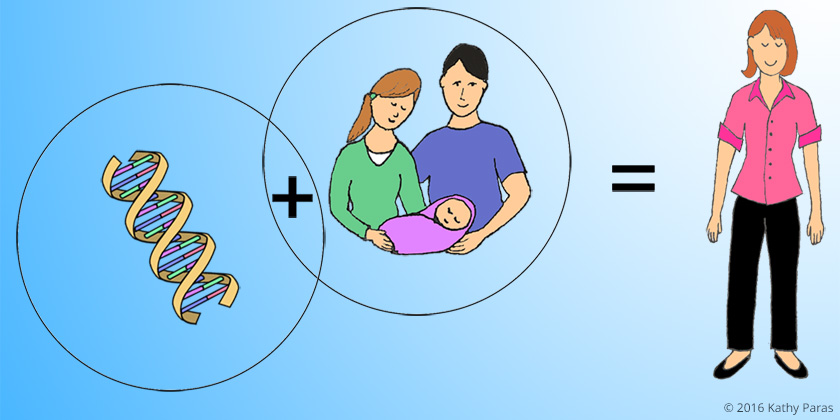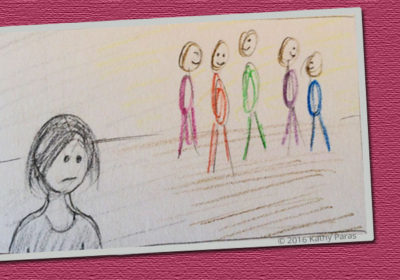Did you know that much of what we think of as our inherent personality—beliefs, attitudes, reactions—is not permanent?
The human mind is so powerful, it can create its own reality. Tell itself a story and make itself believe. We do this to alleviate discomfort. To make sense of things we don’t understand. We do it to survive. And for the most part we are not conscious of the self-deceptions that began early in life.
In adulthood, some of the things we still allow to control and define us are no longer appropriate. Some were never true. They were the invention of a child. With a child’s understanding. And a child’s need to survive.
And they are changeable.
We do not have to be victims of what we experienced early in life. We aren’t doomed to endure life stuck as we are today. And it has nothing to do with changing the world or our environment or other people.
It is the deep, messy, emotional stuff most people avoid. It’s too hard. Why dig into the foundation? Can’t we just paint the walls and move on?
But if we don’t change the underlying drivers, no matter how much we tell ourselves to feel differently, no matter how many slogans we memorize, we will not achieve real change.
Imagine riding the rapids of a swift river, balanced on a surfboard, telling yourself to hold still, to stop going up and down, stop tipping from side to side. You can’t. You have no control over the water. No matter how still you hold your body, you will rise and fall and tip. You need to get yourself to the shore. Step away from the turmoil and stand on solid ground. If you can do that, your world will become calmer. More stable. More still.
But if you blindfold yourself, acknowledging neither the turbulent water under you, nor the stable land nearby, how can you make choices that will improve your situation? What will you base your decisions on if you refuse to look honestly at the conditions that are causing your discomfort or the other options available to you?
Stuff happened. Not your fault.
We are each products of our biology and our history. Our beliefs formed over time, based on the combination of outside influences and our unique capacities, and the way we learned to make sense of those influences and the feelings they invoked.
That combination is different for everyone. We each arrive at the threshold of adulthood equipped with our own unique mash-up of experiences and reactions, behaviors and beliefs. A self-image that defines us. Defines what we believe we are capable of and what we are worthy of having.
It feels unchangeable, because it’s so old it has become part of us. We can’t remember the details of what drives it or where it came from. We’ve just learned to do things this way and make it work the best we could.
It’s time to take off the blindfold and arm yourself with the knowledge you need to improve your life.
You can’t change your past. Your DNA. Your upbringing. Those things simply are.
It is the understanding and acceptance of what happened that can help you learn and grow and heal. Ignored and misunderstood, it will always control you.
Toss the baggage, take your strengths and build a new foundation on dry land.
There is very little about our experience of life—how we behave, what we are capable of—that is unchangeable. Even if we don’t know the way out yet, understanding the situation feels better than ignoring or denying it. Gaining that knowledge takes hard work, an open mind, the willingness to accept difficult and sometimes painful truths about ourselves and those we love. It also takes time, and the perseverance and courage to keep digging, discovering, and accepting. Piece by piece, we can build a new foundation.
1. Know that your baggage is not permanent.
And it’s not helpful. The only value it brings is a vague sense of security because it is familiar. The familiar, no matter how painful, is always more comfortable than the unknown. Don’t settle for the comfortable. The more baggage you cling to, like junk in the attic, the less room you’ll have for new ideas, the less energy and courage to try new things.
2. Let it go.
Trying to control things we can’t will ALWAYS result in failure. Continually acting and failing leads to a feeling of inadequacy, a sense that we are incapable of seeing to our own survival. Walking away or accepting things we can’t control, and focusing our actions on things we can change leads to more successes and a feeling of effectiveness and control over our lives.
3. Look at both sides.
You cannot move forward if you take all the blame. You must look at both sides of the equation honestly.
- Forgive yourself for your past choices—you did what you knew how to do at the time in order to survive. Even if it doesn’t make sense in the context of what you know now, it made sense to that earlier version of yourself.
- Our parents weren’t any less flawed than we are. They probably did the best they could, out of love, but that doesn’t mean we got what we needed or that all of their choices and actions were healthy and appropriate. No matter how well they did or did not prepare you, the rest is on you. They don’t owe you anything. Grieve the loss of what you needed but didn’t get as a child. Let yourself feel the anger and hurt from things you shouldn’t have had to endure. And even though it’s natural to want it, accept that you don’t get retribution.
4. Educate yourself.
Talk to experienced, objective people. Research. Read books… all with an open mind. Evaluate your behaviors and beliefs based on a new, mature, current understanding of reality, and of what is under your control and is your responsibility. Learning how to manage your own life, and live it responsibly, is your obligation as an adult, regardless of what you received or didn’t receive from your parents.
5. Take your time.
Don’t pressure yourself. Honest self-discovery can be scary and overwhelming. Each small step, each new level of understanding builds upon the last. Like an archaeologist conducting the most important dig of his career, you must sift carefully through the layers in the order you find them. Only when you can identify the one at hand, can you be prepared to understand those that follow.
A simple place to start.
Replace this inner dialogue…
This is who I am. I just have to learn to live with it. And so does everyone else.
With this new understanding…
Who I am + The way I was treated = My coping mechanisms that I use unconsciously. They helped me survive childhood, but may be inappropriate for adults. I can recognize them, educate myself, and choose to think and behave differently.
Begin paying more attention to your reactions, attitudes and rationalizations. What history might be driving them? A leftover fear? An unrealistic expectation? A false belief about yourself? Look for resources to help you better understand that aspect of your behavior or your upbringing.
Remember – the goal is not to find someone to blame. The goal is to objectively understand what happened and what is, so that you can learn how to change what you do going forward.




